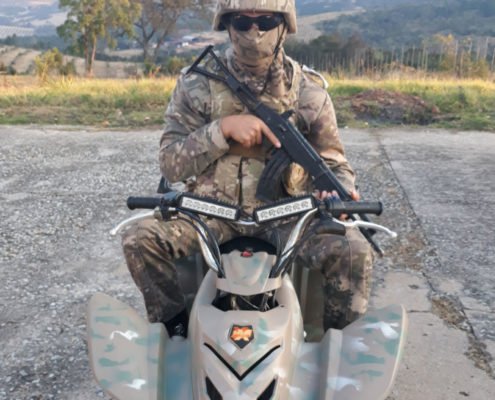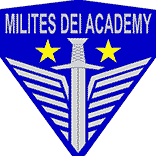MILITARY TRAINING STYLE – FURTHER EDUCATION AND TRAINING CERTIFICATE (FETC): SPECIALIST SECURITY PRACTICES
This military training style certificate is also known as FETC in Specialist Security Practices and is accredited by the Safety and Security Sector Education and Training Authority (SASSETA). The total credits are 137 and the qualification code is 57713.
MILITARY TRAINING STYLE
The practical part of the course is approached from a military training style perspective. Thus, when you are at the academy, you will stay in accommodation with meals per day and uniform included. With that, we incorporate the Milites Dei Academy military training style, where you will be a part of the flag rise, morning exercises as well as drill and other practical military training style skills. This in return, allows you to boost your experience and expertise so that you become a security official that operates with military training style precision, honour and toughness.
 EMPLOYMENT and PROMOTION POSSIBILITIES:
EMPLOYMENT and PROMOTION POSSIBILITIES:
With this qualification, you will be able to acquire the knowledge to:
Use a series of legal and security skills to protect and serve their clients and communities in accordance. Therefore, this will allow the learner to provide a more effective service that will improve both client and community.
In other words, satisfaction and position are provided to fulfil their mission of creating a safe and secure environment. This will be for all who live and work in South Africa.
The learner will also be able to:
- Provide security services to clients.
- Explain and apply current legislative requirements to own area of responsibility.
Range: Area of responsibility refers to the security area for which one is responsible. - Contribute to a safe and secure environment, therefore ensuring better security.
- Communicate with internal and external clients so all parties can be included.
DURATION:
This is a year course on a part-time basis which you will be able to complete online and then have contact sessions at the academy to finalise all the work completed at home and to finalise all the practical parts.
QUALIFICATION RULES
The qualification is made up of a combination of learning outcomes from Fundamental, Core and Elective components. So, totalling 137 minimum credits.
Fundamental Component consists of Unit Standards in:
- Mathematical Literacy at Level 4 to the value of 16 credits.
- Communication at Level 4 in a First South African Language to the value of 20 credits.
- Communication in a Second South African Language at Level 3 to the value of 20 credits.
It is compulsory therefore for learners to do Communication in two different South African languages, one at Level 4 and the other at Level 3.
The Core Component consists of Unit Standards to the value of 61 credits all of which are compulsory.
And the Elective Component: has Specific Focus is that of Supervisory Level and the total value of 93 credits.
UNIT STANDARDS INCLUDED IN THE COURSE
| ID | UNIT STANDARD TITLE | CREDITS | |
| Core | 116534 | Carry out basic first aid treatment in the workplace | 2 |
| Core | 13936 | Outline the legal environment of a selected industry | 2 |
| Core | 13953 | Apply the principles of situational leadership to a business unit | 5 |
| Core | 8600 | Care for Customers, therefore be good at it | 3 |
| Core | 242830 | Conduct a security threat assessment in a defined operational area | 6 |
| Core | 242825 | Conduct evacuations and emergency drills, but in an orderly fashion | 4 |
| Core | 13952 | Demonstrate a basic understanding of the Primary labour legislation that impacts on a business unit | 8 |
| Core | 115226 | Describe human, social and ecological rights in the field of crime and victimisation | 8 |
| Core | 11505 | Identify, handle and defuse security-related conflict | 12 |
| Core | 15096 | Demonstrate an understanding of stress in order to apply strategies to achieve optimal stress levels in personal and work situations | 5 |
| Core | 120480 | Demonstrate an understanding of crime prevention | 6 |
Fundamentals:
| Fundamental | 119472 | Accommodate audience and context needs in oral/signed communication | 5 |
| Fundamental | 119457 | Interpret and use information from texts and understand them | 5 |
| Fundamental | 119467 | Use language and communication in occupational learning programmes | 5 |
| Fundamental | 119465 | Write/present/sign texts for a range of communicative contexts | 5 |
| Fundamental | 9015 | Apply knowledge of statistics and probability to critically interrogate and effectively communicate findings on life-related problems | 6 |
| Fundamental | 119462 | Engage in sustained oral/signed communication and evaluate spoken/signed texts | 5 |
| Fundamental | 119469 | Read/view, analyse and respond to a variety of texts | 5 |
| Fundamental | 9016 | Represent analyse and calculate shape and motion in 2-and 3-dimensional space in different contexts | 4 |
| Fundamental | 7468 | Use mathematics to investigate and monitor the financial aspects of personal, business, national and international issues | 6 |
| Fundamental | 12153 | Use the writing process to compose texts required in the business environment, so this helps with technical writing | 5 |
| Fundamental | 119459 | Write/present/sign for a wide range of contexts | 5 |
The following electives form part of the study:
| Elective | 242812 | Induct a member into a team so they feel welcome | 4 |
| Elective | 117877 | Perform one-to-one training on the job so practical skills get learned | 4 |
| Elective | 13941 | Apply the budget function in a business unit | 5 |
| Elective | 242816 | Conduct a structured meeting, thus be effective | 5 |
| Elective | 14667 | Describe and apply the management functions of an organization | 10 |
| Elective | 13944 | Describe the relationship of junior management to the general management function | 5 |
| Elective | 114877 | Formulate and implement an action plan to improve productivity within an organisational unit | 8 |
| Elective | 11473 | Manage individual and team performance to succeed | 8 |
| Elective | 114589 | Manage time productively, in order to be more effective | 4 |
| Elective | 242819 | Motivate and Build a Team, so great leaders are formed | 10 |
| Elective | 118045 | Supervise the implementation of loss control measures | 8 |
| Elective | 10981 | Supervise work unit to achieve work unit objectives (individuals and teams) | 12 |
| Elective | 117871 | Facilitate learning using a variety of given methodologies in order to do good research | 10 |
